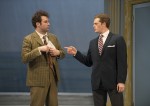Left to right: Andrew McNee as Francis and Martin Happer as Stanley Stubbers in One Man, Two Guvnors at the Arts Club Stanley Theatre. (photo by David Cooper)
It’s always disconcerting when sitting in a theatre listening to everyone laughing while thinking, “What’s so funny?”
That was my experience at the media opening of One Man, Two Guvnors Jan. 28. I’m thinking, therefore, that this review is going to be controversial. Judging by the audience response to the play, I was, with the dozen or so others who left at intermission, clearly in the minority.
Perhaps the problem was that reading the name of the play and about its background, and having been to British period comedies in the past, I had high expectations. I anticipated caustic wit and clever verbal jousting; instead, I was witness to very lame jokes and antiquated slapstick comedy.
Slapstick? Really?
For much of Guvnors, I felt as though I was in a studio audience watching a bad sitcom. It hearkened back to when, as a child, I watched my parents roll in laughter at the likes of Wayne and Schuster’s antics – certainly performances that would draw yawns today.
Now, just in case I’m coming across as a humorless Scrooge who wouldn’t release a guffaw unless I was on laughing gas, let me remind readers of previous reviews. I have snickered at the wit in The Philanderer, joined the multitudes who guffawed to The Producers and fell off my seat convulsing in laughter during Dirty Rotten Scoundrels. But those plays were smart. Witty.
Guvnors seems to play to the lowest common denominator of predictable, parochial humor at the level of arm-pit noises and fart jokes. The main character Francis is compared by the director to Will Ferrell. ‘Nuf said.
Now, before I continue on my rant, let me delve into the plot for some context. The play takes place in 1963 in England, starting in London where Pauline and Allan are preparing for a marriage that looks like it’s going to be thwarted: Pauline’s former fiancé, Roscoe, appears to have come back from the dead. It turns out that Roscoe is, in fact, Rachel, Roscoe’s twin sister, who must keep up the sham that Roscoe is alive until she can collect on the 6,000 pounds Pauline’s father is supposed to give him/her, at which point Rachel plans to run away to Australia with her lover Stanley, who is actually Roscoe’s murderer. Rachel and Stanley become the two “guvnors” to Francis, a poor sod who’s either starving for food or starving for love.
The story picks up in Brighton where the farce of mistaken identities really takes off. Francis, who is the consistent backbone to the plot, finds himself serving both guvnors in one hotel, trying to keep them apart, not knowing their hidden connections. In the end, there is a “happy” ending, with two avoided suicides and three marriages.
In an unusual twist, the performance is introduced by a quartet of musicians, a guitarist, a banjo player, stand-up bass and washboard – the first I’ve seen at the Stanley – that introduces the first and second acts and intersperses the play with fun tunes and singing.
As well, during the show, a few audience members are coerced to come on stage and be part of the performance. (Don’t worry, it’s all part of the act.)
At intermission, I was told by friends enjoying the performance that it is supposed to be silly. Indeed, the director’s notes state that it pays tribute to the vaudeville era of entertainment, the play itself being an adaptation of the beloved 18th-century Italian playwright Carlo Osvaldo Goldoni’s A Servant of Two Masters, which itself is based on the commedia dell’arte of the 16th century.
But so what? In a play where the comedy is predictable, does it really matter if it’s due to bad actors doing a bad job versus good actors intentionally doing a bad job? What’s the difference between a show that recreates outdated theatrics well and one that is simply outdated?
In fact, the play itself suggests there is no difference. In one conversation one character asks, “Does he smell of horses or does he smell like horses?” Suggesting the difference is that a man who smells of horses might have been riding them and, therefore, comes from good stock; whereas a man who smells like horses just smells bad.
His counterpart responds, “Well, it’s all the same in the end, isn’t it?”
Quite so.
Guvnors runs until Feb. 22 at the Stanley Theatre. The Jewish community’s multitalented Anton Lipovetsky is not only the musical director and lead-guitar player in the quartet but also has a small part in the play. Another bright community talent, Ryan Beil, plays the love-struck Allan Dangle. Israeli Vancouverite Amir Ofek designed the sets that hearken back to the Stanley’s original life as a vaudeville house.
Baila Lazarus is a freelance writer, painter and photographer. Her work can be seen at orchiddesigns.net.

